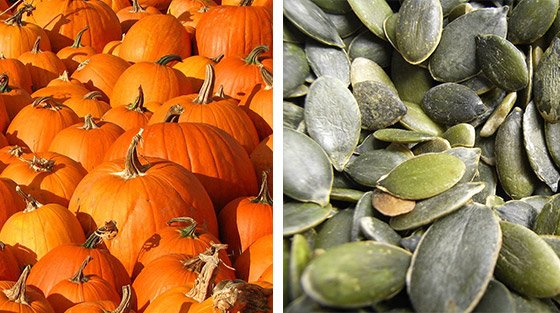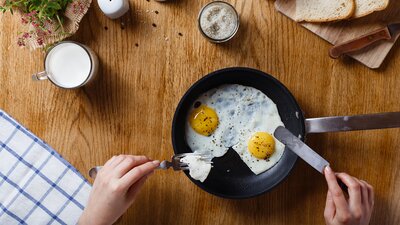At the risk of stating the snoringly obvious, testosterone is important for getting the most from your workouts. You see, testosterone is the most significant anabolic hormone in the body. The more of it you have floating around, the easier you'll be able to gain lean body mass and torch body fat. Although women produce less testosterone than men, finding ways to increase testosterone levels naturally can benefit both male and female physiques.
Luckily for you gym rats, when it comes to making muscle, there's no better place to start than a trip to the supermarket. That's because research continues to suggest that certain edibles contain natural test boosters that can show your muscles some love. And if you think your only options have to involve stopping by the meat and/or seafood counter, you're in for a surprise.
Here's your vegetarian grocery list to raise your T-score!
1. Whole Eggs
Long before CrossFitters and bodybuilders and powerlifters were barking at each other online, there was another "line in the sand" in the fitness community: Do you eat the egg yolks or not?
The "save the whites, toss the yellows" crowd talked about saturated fat, cholesterol, or just fat content in general. The yolkers could point to studies indicating that whole eggs led to greater muscle and strength gains—perhaps three times as much, according to one study. And one muscle-building authority, Jim Stoppani, Ph.D., explains in his video, "The Importance of Eggs" that those benefits may be because of the cholesterol.*
If your goal is to support your natural testosterone production, though, it's pretty clear that the yolks are your friend.*
2. Pumpkin Seeds
These jack-o'-lantern castoffs are a good source of zinc, a mineral that plays a role in thousands of different enzymatic reactions in the body, including those involved in testosterone production. It's no major surprise, then, that a study published in the journal Nutrition found that men with inadequate zinc intake had lower testosterone concentrations.[3]*

These jack-o'-lantern castoffs are a good source of zinc, a mineral that plays a role in thousands of different enzymatic reactions in the body, including those involved in testosterone production.
Sneak more testosterone-boosting pumpkin seeds into your diet by adding them to oatmeal, yogurt, and salads, or even blitz them into your protein shakes.
3. Coconut
Coconut can not only help your diet taste like a tropical vacation, it can also keep your T-score at healthy levels. That's because the giant nut is a source of saturated fat, which plays a role in testosterone production.*
In a study published in The Journal of Clinical Endocrinology and Metabolism, investigators found that healthy males who switched from their regular high-fat diet (13 percent saturated fat) to a low-fat diet (5 percent saturated fat) saw significant decreases in their testosterone levels.[4]*
Physique-minded individuals can obtain up to 10 percent of their calories from saturated fat to help keep testosterone at its peak without any major concern over increasing your risk of coronary woes.*
4. Wheat Bran
Who would have thought that low-brow wheat bran could help jack up your T-levels? But the fiber-rich bran of the wheat kernel is an excellent source of the mineral magnesium. A study conducted by scientists in Turkey found that subjects with higher intakes of magnesium had increased testosterone swirling around.[5]
Also of note, the study found that magnesium was more effective at bolstering testosterone if paired with high-intensity exercise.* Lifting is already well-known as a way to boost testosterone levels, but usually by means of intensity and volume, not nutrient availability!

Who would have thought that low-brow wheat bran could help jack up your T-levels?
Magnesium is required for hundreds of biochemical reactions in the body, and testosterone production is likely one of them. You can sneak more wheat bran in your diet by mixing it into oatmeal, pancake batter, and protein shakes.
5. Ricotta Cheese
This lasagna staple is one of the best sources of whey protein in the dairy aisle, making it useful for muscle-minded people. A study by researchers at the University of Connecticut discovered that subjects who supplemented with whey protein experienced lower levels of the stress hormone cortisol during recovery from lifting weights.[6]*

This lasagna staple is one of the best sources of whey protein in the dairy aisle, making it useful for muscle-minded guys and gals.
Whey is a milk protein that's especially rich in branched-chain amino acids, which appear to help blunt the cortisol response during periods of intense training. This is an important perk considering that cortisol can hinder sex hormone production, making it a testosterone-sapper that may also promote body fat storage.
Of course, unless you're a really, really big fan of Italian food, ricotta isn't the most front-of-mind way to get some whey. That honor goes to protein shakes, one of the best ways to add more meat-free protein to your diet.
6. Strawberries and Other Berries
These rosy berries are a leading source of vitamin C, along with peppers, citrus fruits, and many other fruits (what, you didn't know peppers are a fruit?)
This is good news for your fitness gains, since higher intakes of this potent antioxidant have been associated with lower testosterone-busting cortisol levels in response to hardcore workouts.[7]* It is also integrally involved in countless other bodily processes—too many to count here, unless you have some time on your hands while trying to polish off a bowl of berries.

These rosy berries are a leading source of vitamin C.
Cortisol is a catabolic hormone released by the adrenal glands in response to stressful situations, including intense exercise. Unfortunately, cortisol competes with testosterone, so high levels can crowd out testosterone, thereby reducing its anabolic benefits.
*These statements have not been evaluated by the Food and Drug Administration. This product is not intended to diagnose, treat, cure, or prevent any disease.
Looking for a rock-solid education in the fundamentals of nutrition? Watch Bodybuilding.com's Foundations of Fitness Nutrition Course, a complete nine-video curriculum taught by two registered dieticians. It covers everything from calories to macros, eating for weight loss or muscle gain, which supplements are worth your time and money, and more!
References
- Nimptsch, K., Platz, E., Willett, W., & Giovannucci, E. (2012). Association between plasma 25-OH vitamin D and testosterone levels in men. Clinical Endocrinology, 77(1), 106-12.
- Grimaldi, A., Parker, B., Capizzi, J., Clarkson, P., Pescatello, L., White, M., & Thompson, P. (2013). 25(OH) Vitamin D Is Associated with Greater Muscle Strength in Healthy Men and Women. Medicine & Science in Sports & Exercise, 45(1), 157-162.
- Prasad, A., Mantzoros, C., Beck, F., Hess, J., & Brewer, G. (1996). Zinc status and serum testosterone levels of healthy adults. Nutrition, 12(5), 344-348.
- Wang, C. (2005). Low-Fat High-Fiber Diet Decreased Serum and Urine Androgens in Men. Journal of Clinical Endocrinology & Metabolism, 90(6), 3550-3559.
- Cinar, V., Polat, Y., Baltaci, A., & Mogulkoc, R. (2010). Effects of Magnesium Supplementation on Testosterone Levels of Athletes and Sedentary Subjects at Rest and after Exhaustion. Biological Trace Element Research, 140(1), 18-23.
- Kraemer, W., Solomon-Hill, G., Volk, B., Kupchak, B., Looney, D., Dunn-Lewis, C., ... Volek, J. (2013). The effects of soy and whey protein supplementation on acute hormonal reponses to resistance exercise in men. Journal of the American College of Nutrition, 32(1), 66-74.
- Peters, E., Anderson, R., Nieman, D., Fickl, H., & Jogessar, V. (2001). Vitamin C Supplementation Attenuates the Increases in Circulating Cortisol, Adrenaline and Anti-Inflammatory Polypeptides Following Ultramarathon Running. International Journal of Sports Medicine, 22(7), 537-543.

